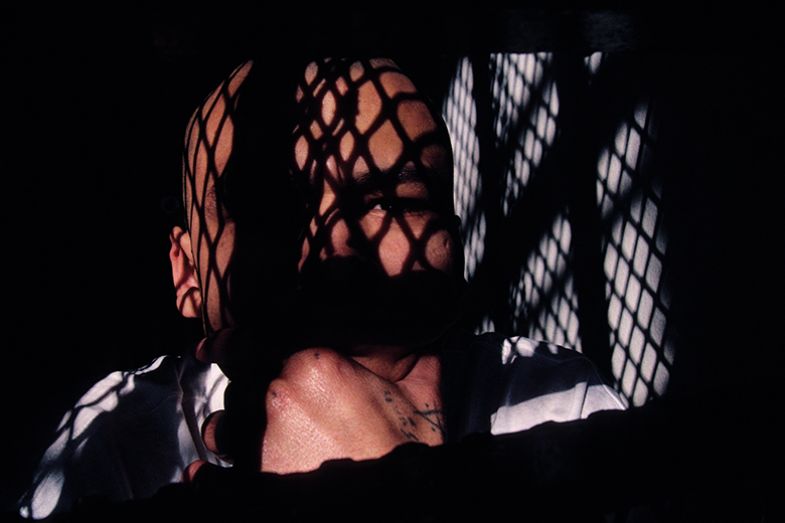Sitting alone in a grubby motorway cafe, David Wilson was afraid that his interviewee was not going to show up. Feeling the watchful eye of the proprietor, the leading criminologist admits that he was about to get up and leave when, at last, the hitman he had arranged to meet walked in.
“I hadn’t seen him enter until he was literally pulling up a chair at my table,” Wilson tells Times Higher Education from the security of his office at Birmingham City University some months later. “I realised that he had probably been watching me for some time to make sure I hadn’t brought someone else along. Was I worried for my safety? Of course, you have to be sensible…" However, getting to hear how hitmen operate was "too good an opportunity to miss”.
A former prison governor-turned-professor of criminology at Birmingham City, Wilson has found himself in a number of precarious situations over the course of his 35-year career. He has stared into the eyes of mass murderers, serial killers and rapists, and diagnosed psychopaths and denied them parole.
He has also befriended some of them. These include Dennis Nilsen, the infamous Scottish serial killer and necrophile found guilty of murdering 12 men and keeping their dismembered body parts as trophies in 1983. Another friend, referred to only as “Jimmy”, murdered an elderly man at the age of 15; Wilson met him playing rugby while governor at Huntercombe prison. Since his release, Wilson’s children have been to Jimmy’s house parties. A third friend, the notorious former bank robber Noel “Razor” Smith, invited Wilson and his family to his wedding (“a lovely day”).
Equally maverick is Wilson’s more recent university work, for which he was determined to interview a hitman, exploring criminal behaviour and the events that potentially lead to murder. Although he calls it “probably the most exciting, amazing research” he has ever conducted, he admits he “would never have got ethical approval. But then, as I point out to a number of people, Stanley Milgram got no ethical approval for his obedience-to-authority experiments. Philip Zimbardo never got ethical approval for the Stanford Prison experiment. The two greatest experiments in social psychology would never have got approval through any university's ethics committees these days.” Wilson therefore decided to grab his chance and “ask for forgiveness once I had done it”.
Having gained the hitman’s trust, he learned all the tips needed to conduct a successful contract murder. “It was like smash-and-grab research because I knew I wasn’t going to have long to talk to him,” he recalls. “He wouldn’t let me record, so I was furiously scribbling notes from memory after.”

Wilson’s latest book, My Life with Murderers: Behind Bars with the World’s Most Violent Men (Sphere), offers an insightful – and surprisingly empathetic – analysis of why some people commit the darkest and most inhumane crimes. So it is worth taking a step back and exploring the rather unusual route that brought him to where he is today.
After Wilson graduated from Cambridge with a PhD in history and philosophy, the natural path was to continue in academia: “I was going to take a junior fellowship or look around for a full-time lecturing job somewhere else, but I was very much on track to be a full-time academic.”
It was a last-minute coincidence that forced him to reflect on his own middle-class privilege and consider other options. “I played rugby and was a winger,” he explains. “On one particular occasion, I got caught by the forwards and there was a particularly dirty foul on me and I punched the person who did it and broke his nose. People thought this was great [and] said ‘Well done’.”
In that same week in 1983, another young man of a similar age from the same town made news headlines after becoming involved in a brawl. While Wilson and his friends had been able to laugh off his own behaviour, the same level of violence had the other man arrested and sent to a youth detention centre.
“I wanted to know why my behaviour in this context – [on] a rugby field as a student – led to people congratulating me, and his behaviour as a working-class boy in the town…[got] punishment,” he reflects. “It was really a philosophical question and one that made me want to have an applied career rather than stay in academia.”
In a move that surprised everyone around him, therefore, Wilson took a job as assistant governor at Wormwood Scrubs prison. From there, he went on to work at Grendon and Woodhill prisons and two young offenders’ institutions, becoming governor of Finnamore Wood in Buckinghamshire at the age of 29.
It was at Woodhill that Wilson helped set up two specialist units for the most notoriously disruptive prisoners, a time he describes as “the best years of my prison life”. The centres were radical for the early 1990s, designed to allow open spaces and natural lighting, with days scheduled around group therapy sessions. Rooms were air-conditioned – something that caused controversy at the time, with taxpayers questioning why the country’s most violent criminals should live in such luxury. The answer, according to Wilson, was that studies had shown reduced levels of violence in cooler temperatures. But the politics of the time meant that the public were not behind such schemes, and Woodhill’s leaders faced obstacles when they attempted to expand the units.
In 1997, after a working trip to look at the Albanian prison system – which proved “so much better than in the UK” – Wilson decided to quit the service and take up a professorship at Birmingham City. Although he stresses that this was by no means inevitable, it is clear that he had been fascinated by some bigger and more theoretical issues throughout his prison years. “Undoubtedly, I was intrigued,” he says. “I think I used a phrase in the book, ‘I wanted to know when the light in [a psychopath’s] head that connected him to the rest of humanity got switched off’. I found it an interesting philosophical question as well as a clinical insight into why people [like him] might do what [he] did.”
Although reluctant to criticise academic criminologists without real-world experience, Wilson is proud to emphasise that the course he teaches on at Birmingham City is “more American than British”, explaining that “American criminology degrees are very hands-on, very applied, as well as being theoretical”. He also stresses that “all of my knowledge of violent men really comes from talking to violent men”. His interview with the hitman, for example, proved far more revealing than academic analyses relying on “police reports, court transcripts and so forth”.
One has only to sit opposite Wilson – as so many convicts have done in the past – to get a somewhat disturbing sense of his interview technique. Within 10 minutes of meeting him, he is able to give a character assessment that is sharp, bordering on brutal. Every spoken detail is remembered and every movement analysed.
In today’s climate, Wilson believes that applied prison research in its traditional form is becoming increasingly difficult to conduct. Perhaps unsurprisingly, the prison service “don’t particularly like my research. In fact, it is easier to get permission to go into Putin’s prisons in Russia than it is to get into prisons in this country.” This may be another factor that has pushed him towards investigating more sociological questions, such as “Why do hitmen target their victims on doorsteps?”

Now that he is an emeritus professor, Wilson’s days are generally divided between teaching and media appearances. He is asked to advise on police cases and sometimes speaks out on policy issues, on one occasion arguing that the UK would do well to divert “some of the billions of pounds that are spent on our criminal justice system…into the community, where we could stop problems happening in the first place”.
His public appearances have sometimes led to accusations that Wilson is “glamorising” psychopathy and murder, yet he insists that he is doing the opposite: "I’m trying to de-glamorise. I’m trying to show the reality, I’m trying to move the debate on…I’ve appeared on enough TV and radio programmes to understand how to present some of these arguments in a way that I think can be popular, but also authentic and revealing.”
When asked to go on the popular UK television programme Russell Howard’s Good News, for example, Wilson agreed on the condition that he could debunk some of the common myths around psychopathy. He was more excited by an opportunity in 2016 to present a BBC Radio 4 programme, In the Criminologist’s Chair, that allowed him to interview his good friend Noel “Razor” Smith – a clinically diagnosed psychopath – about whether he was capable of feeling remorse. It is now used by some universities as “a teaching tool”, he reports.
Although offered “probably five or six programmes a month”, Wilson accepts as few as one every six months, “because there are some things that just won’t allow me to be authentic…They want to use me to continue a very unedifying popular discourse about whatever it is they want to shout about.”
Given the increasing interest in true crime, Wilson could easily leave academia behind and rely on TV and other media to communicate his ideas. But he is determined to not go down that road: “Presenting TV programmes gives me the widest and most immediate impact, but the long-term impact comes from training all those first-year, second-year and third-year students. And I keep in touch with them, going back to 1997. They work in the police, with charities and I regularly keep in contact with them – I’m far more regularly in contact with them than with the likes of Smith.”
Criminology has become an increasingly popular choice for British undergraduates, with Birmingham City receiving a record 2,000 applications for 100 places last year. Wilson is delighted to be able to quash some of young people’s expectations (“You won’t believe how many times I’m asked things like ‘When will I see a dead body?’”) and push back against the “utter shite” circulated by popular gonzo-journalism books such as Jon Ronson’s The Psychopath Test.
Wilson encourages his students to develop criminal friendships of their own, since “one of the things that you have to explain to students in particular is that if you want to get information out of someone, you have to establish some form of rapport. You’ve got to use the skill of making friends without being friends.”
The personal connections he has made, as well as his increasingly public profile, mean that Wilson receives hundreds of letters and emails, some asking him to reopen cases with appeals such as: “My uncle/my son/my daughter/my grandmother went missing or was murdered. The police won’t do anything about it, can you do something about it to help me?”
Although the emotional burden of dealing with such letters and other traumatic material sounds huge, Wilson claims he has always been able to “compartmentalise” his life, “to shut it off at the end of the day”.
“I’m very psychologically robust,” he says. “The reason I’ve been able to keep healthy is because I have a good family life. I’ve been married for nearly 30 years, I’ve two wonderful children, I’ve got an interest in sport…that keeps me grounded.”
POSTSCRIPT:
Print headline: A life in crime
Register to continue
Why register?
- Registration is free and only takes a moment
- Once registered, you can read 3 articles a month
- Sign up for our newsletter
Subscribe
Or subscribe for unlimited access to:
- Unlimited access to news, views, insights & reviews
- Digital editions
- Digital access to THE’s university and college rankings analysis
Already registered or a current subscriber? Login








